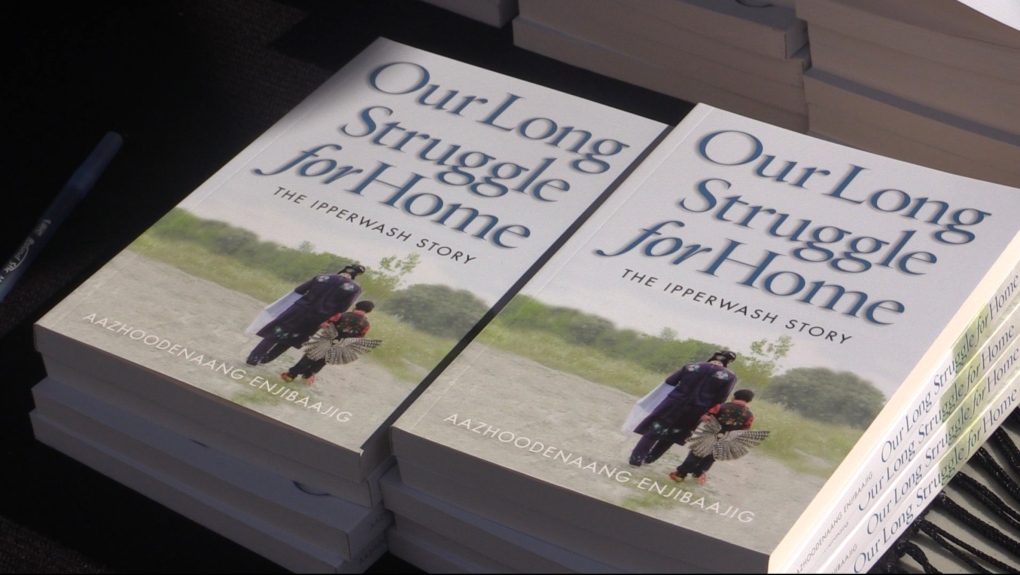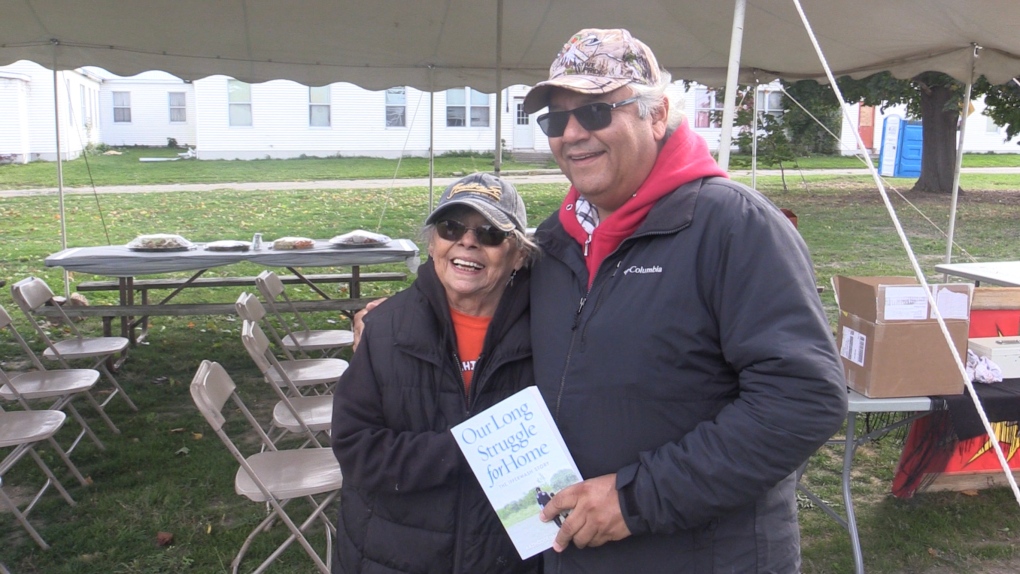‘Our Long Struggle for Home’: Camp Ipperwash residents tell personal stories in new book
Nearly 30 years after members of Stoney Point First Nation began an occupation of Camp Ipperwash, only about 50 people remain living at the former Military Training Centre in Lambton County.
CTV News was invited inside the gates of the camp Saturday as some of those residents launched a new book titled ‘Our Long Struggle for Home.’
The book tells personal stories of the decades-long battle of broken promises by the government and their fight to reclaim their homeland before and after the Ipperwash Crisis in 1995.
“This is first time our story is going to be presented because it hasn't been before,” says Carolyn ‘Cully’ George, who has lived at the camp since 1995.
“Hopefully people will have some kind of understanding for us now and maybe not be so racist.”
George is the sister of Dudley George — who was the protester killed by Ontario Provincial Police during the occupation of Ipperwash Provincial Park on Labour Day weekend in 1995 — which would later be called the Ipperwash Crisis.
 A book with first hand stories from residents of Camp Ipperwash in Lambton County, Ont. was launched on Saturday, Oct. 15, 2022. (Brent Lale/CTV News London)
A book with first hand stories from residents of Camp Ipperwash in Lambton County, Ont. was launched on Saturday, Oct. 15, 2022. (Brent Lale/CTV News London)
“There's no history anywhere,” says Carolyn. “How much history did you ever learn about us? Just that there was an us?”
Prior to the Second World War in 1942, Canadian officials expropriated the ancestral territory for a military base, promising to return the land after the war. By 1993, the elders had waiting long enough and entered the active camp and began living on the firing range.
Later that summer, the government moved the cadet camp to CFB Borden and some of those who entered the camp, as well as their descendants are still living there today.
“We're still here,” says Alabama Bressette, Carolyn’s granddaughter and Dudley’s great niece, who says she’s faced a lot of racism in her life, especially when she attended school in nearby Forest, Ont.
“That's what everybody likes to say because when the government took the land for the war practices, they said they were going to give it back, but they didn't. So, growing up, I got to hear about my grandparents sneaking in, use the land to pick medicines, sing and use it for ceremonies. They had to hide it before, but now with this book we're out in the open. We're saying ‘we're here and you don't have to hide.’”
Among those who purchased a book Sunday was Michael Beachey. He was a former cook in the kitchen at the camp in 1993, and became good friends with Dudley who he worked alongside.
Beachey got those who contributed to the book to sign his copy.
“I have a long history here,” says Beachey.
“I was here as a cook at Savoy kitchen and that's how I met everybody moving back home to their community. I would sneak the leftover food from the kitchen out to the ranges for those living out there.”
 Michael Beachey (right) poses for a picture with Carolyn George after purchasing a book Sunday at Camp Ipperwash. Beachey worked at the camp in 1993, and was friends with Carolyn’s brother, the late Dudley George in Lambton County, Ont. on Saturday, Oct. 15, 2022 (Brent Lale/CTV News London)
Michael Beachey (right) poses for a picture with Carolyn George after purchasing a book Sunday at Camp Ipperwash. Beachey worked at the camp in 1993, and was friends with Carolyn’s brother, the late Dudley George in Lambton County, Ont. on Saturday, Oct. 15, 2022 (Brent Lale/CTV News London)
Beachey paused when thinking how it’s been 27 years since he lost his friend Dudley, but preferred to remember the good times of sharing their lives together and watching them take a stand to get their home back.
“Nobody knew what was happening with the story,” says Beachey.
“No one knew why they were here in the military base. It's a sad story what happened with the government taking their land, and it's a long time for this to be returned. I wish things go faster, and just get us back to more normal living conditions.”
The living conditions in some areas have been described as “deplorable.” They have lived in the barracks built with asbestos, lead paint with leaking roofs and no potable water in the units.
However, today there are some new trailer units at the north end of the camp.
An agreement to return the Camp Ipperwash land was signed in 2016. Along with a $95 million payment by the Federal Government, the land was signed over to the Kettle and Stoney Point First Nation.
George says six years later, she’s still waiting for some of that money to be spent on those living in Stoney Point.
“They gave money over to Kettle Point for them to dish it out, and we're still waiting for it,” says George, who says she’d like something as simple as a landline telephone.
“We’re supposed to get a water tower, and I see Kettle Point has one. We’ve been here a long time, and where’s the help to get our community going? They pass the money to Kettle Point but they don’t pass it over to us.”
She added they’ve stayed at the camp after fearing their land would be sold to a developer after the deal was signed between the band council and the government.
Bressette hopes that people read this book, and hear insight into what really happened at the camp.
“My entire life, everywhere I went I've tried to share stories of what life is like in here and what the people are like,” says Bressette.
“This is a little opening, a little door to what we want, what we're like here and how kind we are to each other. We all want the same thing, and that is everything to come back to be peaceful.”
CTVNews.ca Top Stories

LIVE UPDATES Tracking the L.A. wildfires
A series of wildfires are searing through the Los Angeles area, forcing many to evacuate their homes. Follow along here for the latest updates. Numerous buildings were destroyed and nearly 3,000 acres burned in the Pacific Palisades. Weather conditions are expected to deteriorate further through today.
Doug Ford to make announcement after telling Trump that Canada is 'not for sale' in Fox News appearance
Ontario Premier Doug Ford is set to make an announcement Wednesday morning, less than 24 hours after appearing on another U.S. network to rebuff incoming president Donald Trump’s threat of acquiring Canada as the 51st state.
W5 Investigates 'I'm in financial ruin': Canadian homeowners sound alarm over contractor accused of fraud
This W5 investigation focuses on mother and daughter homeowners who found themselves in a fight with a general contractor over money they say they're owed, and over work that was never completed on their dream home.
'What are we talking about?' Experts respond to Trump's 'economic force' comments
Incoming U.S. president Donald Trump's threats to use 'economic force' against Canada and its industries are sparking worry and disbelief.
Is Donald Trump kidding? Americans in Canada react to tariff, annexation threats
While Donald Trump's comments on tariffs and Canada becoming 'the 51st state' have drawn anger and fear among Canadians, reaction from Americans who live, study or work in Canada has been mixed, and is largely influenced by how they voted in the presidential election.
4 generations on 1 lot: One family's creative response to B.C.'s housing crisis
A single lot in Delta, B.C., that used to be home to a single rancher built in the 80s is the site of four separate homes, housing four generations of the same family.
Thinking of a career change? Here's what employers are hiring for this year
As 2025 gets into full swing, gaps in Canada's job market offer new opportunities to start fresh -- in some sectors, more than others.
Thousands flee as wildfires burn out of control in and around Los Angeles and homes are destroyed
Wildfires tore across the Los Angeles area with devastating force Wednesday after setting off a desperate escape from burning homes through flames, ferocious winds and towering clouds of smoke.
OpenAI boss denies sexually assaulting his sister after she files lawsuit
OpenAI Chief Executive Sam Altman has denied sexually abusing his sister when she was a child, after she filed a lawsuit in the United States accusing him of regularly sexually abusing her between 1997 and 2006.
































